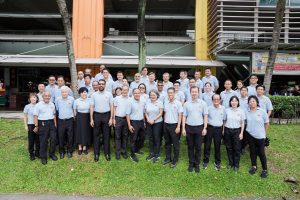A Singapore court yesterday found the country’s opposition leader guilty of lying under oath to Parliament, potentially impacting his party’s chances at the general election that is due to be held by November.
Pritam Singh, a member of Parliament and leader of the Workers’ Party, was convicted on two counts of lying to a parliamentary committee under oath and was fined S$7,000 ($5,231) for each count. He has pledged to appeal the convictions.
However, Singh, 48, will retain his seat in Parliament and remains eligible to run in this year’s general election, given that his two fines were below the S$10,000 threshold outlined in the constitution, above which an MP loses their seat and is barred from public office for five years.
Singh’s charges were related to his handling of a scandal involving Raeesah Khan, a former MP from his party, who admitted that she had repeatedly lied to Parliament in August 2021 about alleged police mistreatment of a victim of sexual assault. Khan was fined S$35,000 for lying and abusing her parliamentary privilege, and subsequently resigned from the party and from Parliament.
A parliamentary committee then convened to investigate the matter, during which Singh was questioned at length about how he dealt with Khan and her allegations. The committee later concluded that Singh had not been truthful to the committee, and recommended a criminal investigation into his conduct. Prosecutors agreed, and in March of last year charged him with making two false statements during the committee’s proceedings.
During his testimony Singh maintained he had urged Khan to own up to Parliament about her lie, according to Reuters. Judge Luke Tan said during yesterday’s hearing that there was ample evidence and witness testimony to prove otherwise.
“Ms. Khan admitted to other WP leaders she had lied, there was absolutely no follow-up from the accused,” Tan told the court. “This could only be because the accused had mentioned that this, and quote, was ‘probably something we would have to take to the grave’.”
Singh has previously said that he was “unable to accept” the committee’s findings and that he “intends to clear his name.” Speaking to the press after yesterday’s hearing, he said that verdict would not dent the morale of his party in the run-up to the next general election, which has to take place by November 23, but could be called as early as May.
“I leave it to the public again to determine how they want to exercise their vote in what we in the Workers’ Party believe is the need of the hour in Singapore, which is the evolution towards a more balanced political system,” he told reporters. “We have met with numerous obstacles in the course of our political lives. We have shown resilience and in that regard, this case won’t be any different.”
It is unclear what impact the verdict, and the possible appeal process, will have on the upcoming general election. While the People’s Action Party (PAP) is almost certain to win a large fraction of the seats in Parliament, there is a lot at stake by Singaporean standards. It will be the first time that the PAP will face voters since Prime Minister Lawrence Wong took the baton of leadership from Lee Hsien Loong in May of last year.
The party is also seeking to redress a decline in support among younger voters. Despite winning 83 of the 93 seats in parliament and 61 percent of the popular vote at the last general election in 2020, the PAP’s support fell 9 percent from the general election of 2015.
The PAP has also been forced to deal with a number of scandals that have disturbed the usually placid waters of high-level Singaporean politics. These include the corruption case involving former Transport Minister S Iswaran, who was convicted and jailed in October, and the resignation of two senior PAP officials, including the parliamentary speaker Tan Chuan-Jin, over an “inappropriate relationship.” Then there has been the ongoing and bitter feud among the children of founding father Lee Kuan Yew, who have clashed to the point of estrangement over how to handle the elder Lee’s patrimony.
For the Workers’ Party, too, the upcoming election is important. At the 2020 election, the party increased its share of seats in Parliament from six to 10 – the largest return for an opposition party since the city-state’s independence in 1965. After the election, Singh became the first opposition leader in Singapore to be formally designated as such, with then Prime Minister Lee Hsien Loong recognizing that the election result reflected “a strong desire among Singaporeans for a greater diversity of views in politics.”
Singh’s disqualification would have been a serious blow to the Workers’ Party, as it seeks to build on these gains in 2025 and begin posing a more significant challenge to the hegemonic PAP. The party has faced its share of scandals since the last election. In addition to l’affaire Khan, two prominent members of the party, MP Leon Perera and Nicole Seah, the head of the party’s youth wing leader, stepped down in mid-2023 over an extramarital affair.
Even though Singh avoided disqualification, the fact he has now been convicted of lying under oath may taint the image of his party – and the PAP’s loss may not necessarily be the Workers’ Party’s gain. The 2020 general election also saw the electoral debut of the Progress Singapore Party (PSP), a new party headed by the ex-PAP stalwart Tan Cheng Bock. The party did not win any seats but came away with just over 10 percent of the popular vote; and while the Workers’ Party increased its share of seats in Parliament, its share of the popular vote actually declined slightly amid the PSP’s gains.
As important as the balance of support between the PAP and the opposition at this year’s election will be how the vote is split within the opposition.

































